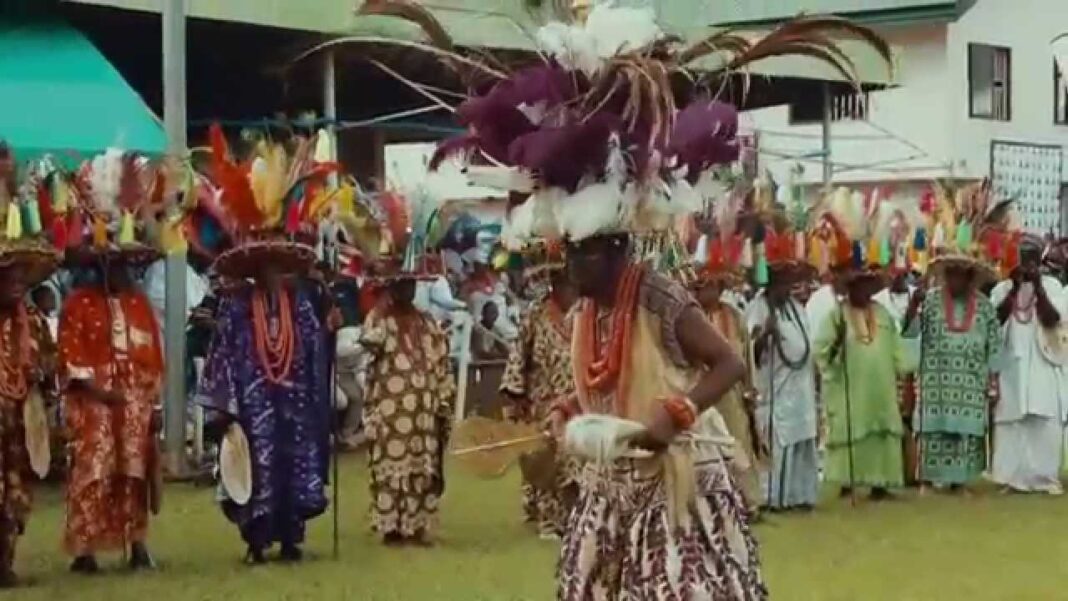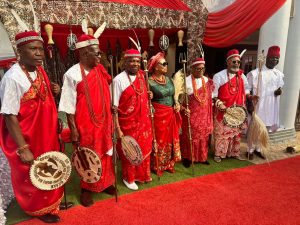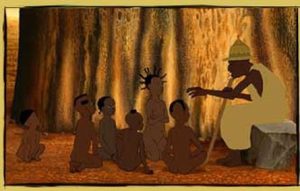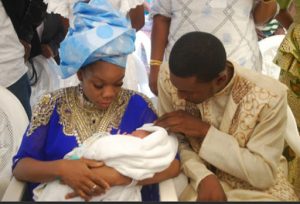Among the Igbo people of southeast Nigeria, especially in the Onitsha kingdom, the Ofala Festival is a major cultural occasion. Celebrating the Igbo royal system, this yearly celebration—also known as the “Ofala Nna—marking the anniversary of a king’s (Obi’s) arrival to the throne Reflecting the great love and admiration the Igbo people have for their traditional leaders, the celebration is a vibrant and complex presentation of royal majesty, communal pride, and cultural legacy. This page offers a thorough summary of the Ofala Festival along with historical background, importance, customs, and modern relevance.
Historical Origins and Cultural Significance
The ancient customs of the Igbo people, especially in the Onitsha kingdom where the celebration is most well-known, form the foundation of the Ofala celebration. Two Igbo words—”Ofo,” signifying authority or power, and “Ala,” meaning land—determine the term “Ofala.” Together, Ofala represents the king’s power over the territory and his responsibility as defender of the customs and values of the people.
Traditionally, the Ofala Festival was an occasion for the people to gather to respect their monarch, mark his rule, and reafford their loyalty to him. Reiterating his position as the highest leader of the people, the celebration also allowed the monarch to display his riches, authority, and contacts. With the monarch at the top, followed by his chiefs, elders, and the rest of the country, the Ofala Festival helped to maintain the social order within the kingdom.
Apart from its political and social relevance, the Ofala Festival includes spiritual elements. The Igbo people see their monarch as a heavenly person selected by the gods to guide and guard the people. Thus, the celebration is a moment to respect the gods and ancestors, ask for their blessings, and guarantee the kingdom’s ongoing wealth and welfare. The Ofala Festival is an assertion of the spiritual beliefs and cultural identity of the people as much as a celebration of the king’s rule.
Rituals and Ceremonies
Each of the many rites and ceremonies that define the Ofala Festival has symbolic meaning and relevance. Usually lasting two days, the holiday opens with private rites on the first day and public festivities on the second.
Celebrated as “Iru Ofala,” the first day of the event is set aside for the monarch and his close circle. The monarch withdraws to his palace during this day to go through a sequence of purifying ceremonies. The monarch’s spiritual advisers carry out these rites, calling out the blessings of the gods and ancestors to ready the king for the public festivities that follow. During this period the monarch also interacts with the gods in search of direction and protection for his rule and the welfare of his people.

The monarch leaves his palace on the second day to visit his people in a great parade. Among the centerpieces of the celebration is this procession called “Ikpata Ofala.” Accompassing his chiefs, fighters, and other dignitaries, the monarch, attired in his full regalia—including a crown, coral beads, and a royal robe—is carried in a palanquin or walks around the realm. Drumming, singing, and dancing enhance the joyful mood of the regal magnificence exhibition that is the parade. Cheering and respecting the monarch as he goes past, the people of the realm line the streets.
Following the parade, the monarch goes back to the palace where he settles on the throne to pay respect to his people. Known as “Igo Ofala,” this section of the celebration is when the monarch interacts with his people, hears their worries, and bestows blessings. Presenting presents to the monarch and promising their ongoing support, the leaders and elders of the realm also use this chance to restiter their allegiance to him.
Along with several cultural events like music, masquerades, and traditional dances, the Ofala Festival features These shows honor Igbo cultural legacy by highlighting people’s creative ability and ingenuity. Along with eating on a range of traditional meals and beverages presented to the guests and attendees, the event marks Food and drink shared among people helps to strengthen unity and solidarity within the kingdom.
Cultural and Social Importance
For the Igbo people, the Ofala Festival is very important on social and cultural levels. Remarkably symbolic of the monarchy system, which still defines Igbo culture fundamentally, the event is By means of the celebration, the people show their respect for their monarch, therefore reiterating his position as the political and spiritual head of the society. With the monarch in the center surrounded by his chiefs, elders, and subjects, the celebration also supports the social structure inside the realm.
Furthermore significant for the preservation and dissemination of Igbo cultural legacy is the festival. Rich cultural customs of the Igbo people are reflected in the many rites, ceremonies, and performances carried out throughout the celebration. The celebration gives the younger generation a chance to learn about their history, customs, and values, therefore guaranteeing that these traditions will be handed on to next generations.
Apart from its social and cultural value, the Ofala Festival has financial ramifications. travelers from all over, including members of the Igbo diaspora, travelers, and cultural vultures, the event draws The local economy benefits from this flood of tourists as it offers chances for commerce, hospitality, and other kind of businesses. The celebration also provides a stage for exhibiting Igbo arts, crafts, and other cultural goods, therefore highlighting the legacy of the community to a larger audience.
Contemporary Relevance
Notwithstanding the difficulties of modernity, urbanization, and the impact of other cultures, the Ofala Festival has kept shining in current times. The event has evolved to fit shifting societal dynamics while maintaining its core principles and importance. For instance, the celebration is now extensively reported on many media outlets, including radio, television, and social media, which has helped to draw more attendees and raise knowledge about Igbo civilization.
Since it gives individuals from all origins and cultures the chance to experience and appreciate the rich legacy of the Igbo people, the celebration has also grown to be a forum for cultural interaction. The celebration allows the Igbo people to gather, honor their common past, and advance cultural harmony and understanding.
The Ofala Festival is still a very spiritual and community celebration notwithstanding these developments. The celebration is a potent statement of Igbo identity and pride, and the rites and ceremonies are carried out with the same respect and dedication as they have always been. The ongoing celebration of the Ofala Festival is evidence of the fortitude of Igbo culture and the need of preserving cultural continuity in the face of change.
Conclusion
Reflecting the great regard and veneration the Igbo people have for their traditional leaders, the Ofala Festival is a vivid and important cultural event. By means of its complex rites, ceremonies, and performances, the festival effectively expresses Igbo cultural legacy, social hierarchy, and spiritual beliefs. The event marks not only the king’s rule but also a reaffirmation of the cultural identity and values of the society.
The Ofala Festival is a cultural event that has endured throughout time, adjusting to changing socioeconomic circumstances while maintaining its central relevance. Still a major part of Igbo culture, the celebration highlights the significance of the royal institution and the principles that define the way of life for the people. The Ofala Festival reminds us in a fast changing environment of the value of cultural preservation and the continuing power of Igbo legacy.
Please read all our stories on African Culture here




